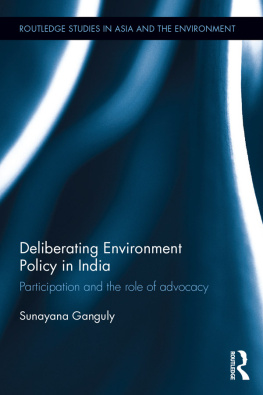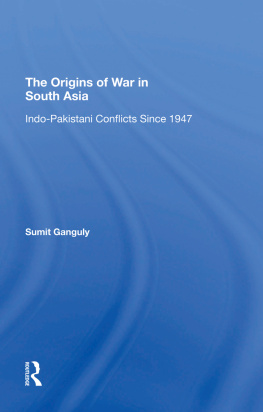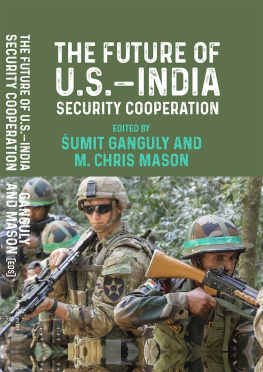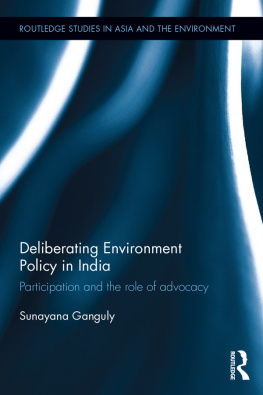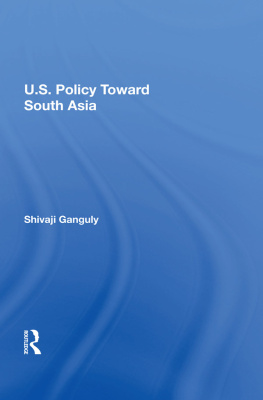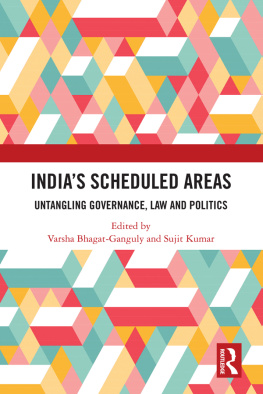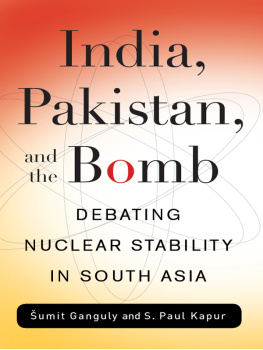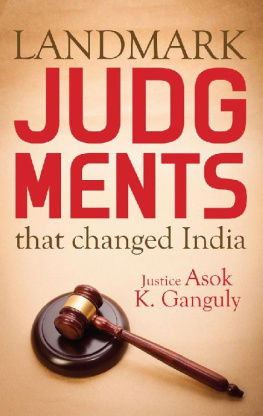Deliberating Environment Policy in India
As one of the worlds largest and most bio-diverse countries, Indias approach to environmental policy will be very significant in tackling global environmental challenges. This book explores the transformations that have taken place in the making of environmental policy in India since the economic liberalization of the 1990s. It investigates if there has been a slow shift from top-down planning to increasingly bottom-up and participatory policy processes, examining the successes and failures of recent environmental policies. Linking deliberation to collective action, this book contends that it is crucial to involve local actors in framing the policies that decide on their rights and control over bio-resources in order to achieve the goal of sustainable human development.
The first examples of large-scale participatory processes in Indian environmental policy were the 1999 National Biodiversity Strategy Action Plan and the 2006 Scheduled Tribes and Other Traditional Forest Dwellers Act. This book explores these landmark policies, examining the strategies of advocacy and deliberation that led to both the successes and the failures of recent initiatives. It concludes that in order to deliberate with the state, civil society actors must engage in forms of strategic advocacy with the power to push agendas that challenge mainstream development discourses. The lessons learnt from the Indian experience will not only have immediate significance for the future of policy making in India, but they will also be of interest for other countries faced with the challenges of integrating livelihood and sustainability concerns into the governance process.
Sunayana Ganguly is a Research Associate, Industrial Ecology Group, University of Lausanne, Switzerland and Post-Doctoral Fellow, Ashoka Trust for Research in Ecology and the Environment (ATREE), Bangalore, India.
Routledge Studies in Asia and the Environment
The role of Asia will be crucial in tackling the worlds environmental problems. The primary aim of this series is to publish original, high-quality, research-level work by scholars in both the East and the West on all aspects of Asia and the environment. The series aims to cover all aspects of environmental issues including how these relate to economic development, sustainability, technology, society, and government policies and aims to include all regions of Asia.
1Climate Change Governance in Chinese Cities
Qianqinq Mai and Maria Francesch-Huidobro
2Sustainability in Contemporary Rural Japan
Challenges and opportunities
Stephanie Assmann
3Deliberating Environmental Policy in India
Participation and the role of advocacy
Sunayana Ganguly
Deliberating Environment Policy in India
Participation and the role of advocacy
Sunayana Ganguly

First published 2016
by Routledge
2 Park Square, Milton Park, Abingdon, Oxon OX14 4RN
and by Routledge
711 Third Avenue, New York, NY 10017
Routledge is an imprint of the Taylor & Francis Group, an informa business
2016 Sunayana Ganguly
D 188
The right of Sunayana Ganguly to be identified as author of this work has been asserted by her in accordance with sections 77 and 78 of the Copyright, Designs and Patents Act 1988.
All rights reserved. No part of this book may be reprinted or reproduced or utilised in any form or by any electronic, mechanical, or other means, now known or hereafter invented, including photocopying and recording, or in any information storage or retrieval system, without permission in writing from the publishers.
Trademark notice: product or corporate names may be trademarks or registered trademarks, and are used only for identification and explanation without intent to infringe.
British Library Cataloguing-in-Publication Data
A catalogue record for this book is available from the British Library
Library of Congress Cataloging-in-Publication Data
Names: Ganguly, Sunayana, author.
Title: Deliberating environment policy in India : participation and the role of advocacy / Sunayana Ganguly.
Description: New York, NY : Routledge, 2016. | Series: Routledge studies in Asia and the environment | Includes bibliographical references.
Identifiers: LCCN 2015021311
Subjects: LCSH: Environmental policyIndia. | Environmental policyIndiaCitizen participation. | Sustainable developmentIndia. | IndiaEconomic policy1991 | IndiaEconomic policyEnvironmental aspects.
Classification: LCC HC440.E5 G37 2016 | DDC 333.70954dc23LC record available at http://lccn.loc.gov/2015021311
ISBN: 978-1-138-81943-6 (hbk)
ISBN: 978-1-315-74447-6 (ebk)
Typeset in Times New Roman
by Apex CoVantage, LLC
Contents
Figure
Tables
| AAP | Aam Aadmi Party |
| BJP | Bharatiya Janata Party |
| BSAP | Biodiversity Strategy Action Plan |
| CBD | Convention on Biological Diversity |
| CFP | call for participation |
| CMP | Common Minimum Programme |
| CPI(M) | Communist Party of India (Marxist) |
| CSD | Campaign for Survival and Dignity |
| CSO | Civil Society Organization |
| CWH | Critical Wildlife Habitat |
| FRA | Scheduled Tribes (Recognition of Forest Rights) Act |
| GEF | Global Environment Facility |
| GoM | Group of Ministers |
| IPR | intellectual property rights |
| JFM | joint forest management |
| JPC | Joint Parliamentary Committee |
| MoEF | Ministry of Environment and Forests |
| MoTA | Ministry of Tribal Affairs |
| NBSAP | National Biodiversity Strategy and Action Plan |
| NBWL | National Board for Wildlife |
| NDA | National Democratic Alliance |
| NFFPFW | National Forum of Forest People and Forest Workers |
| NGO | non-governmental organization |
| NTFP | non-timber forest produce |
| PA | protected areas |
| TPCG | technical and policy core group |
| TRIPS | trade-related aspects of intellectual property rights |
| TSG | Technical Resource Group |
| UNDP | United Nations Development Programme |
| VO | voluntary organizations |
| VSS | Van Suraksha Samitis |
| WLPA | Wildlife Protection Act |
| WTO | World Trade Organization |
I would like to start with expressing my most sincere gratitude to everybody who has been part of this journey. This book has emerged from the doctoral research I carried out at the Freie Universitt Berlin, and it has been a true experience of bridging East and West, with all its contradictions, frustrations and joy. While it is impossible to detail the contributions of every individual, and many have remained unacknowledged by name, I would like to thank this large ecosystem of people spanning several countries for their unflinching support and generosity. I hope this study does justice to their contributions.

